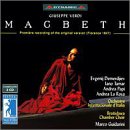| All Artists: Giuseppe Verdi, Marco Guidarini, Evgenij Demerdijev, Iano Tamar, Orchestra Internazionale d'Italia, Andrea Papi, Andrea La Rosa Title: Verdi - Macbeth / Demerdijev · Tamar · Papi · La Rosa · Guidarini Members Wishing: 1 Total Copies: 0 Label: Dynamic Italy Release Date: 6/15/1997 Album Type: Import Genre: Classical Style: Opera & Classical Vocal Number of Discs: 2 SwapaCD Credits: 2 UPCs: 789368665426, 8007144601942 |
Search - Giuseppe Verdi, Marco Guidarini, Evgenij Demerdijev :: Verdi - Macbeth / Demerdijev · Tamar · Papi · La Rosa · Guidarini
 | Giuseppe Verdi, Marco Guidarini, Evgenij Demerdijev Verdi - Macbeth / Demerdijev · Tamar · Papi · La Rosa · Guidarini Genre: Classical
|
Larger Image |
CD Details |
CD ReviewsThe Original Macbeth-Premiere Recording dwadefoley | New York, New York United States | 03/31/2001 (3 out of 5 stars) "Most of the opera-going public knows that the version of Verdi's Macbeth they typically hear is a revision. The changes date from 1865, when Verdi revised the opera for Paris. Over a number of decades, the original 1847 version gradually disappeared, the refinements offered by the 1865 version better suiting modern taste. All of the recordings to date have offered us this 1865 revision, with some minor differences even between these. The Dynamic recording reviewed here is the first commercial recording of the original version as performed at the Pergola in Florence in 1847. The differences are substantial enough to persuade one to buy this recording. Some of the 1865 revisions included: 1. Substituting Lady Macbeth's familiar aria "La luce langue" for the fierce cabaletta "Trionfai! Secure alfine" 2. Replacing Macbeth's cabaletta "Vada in fiamma", which occurred after he faints in the witch's cavern, with his second duet with Lady Macbeth 3. Removing Macbeth's two-part aria-finale and replacing it with and ensemble finale. 4. Removing another chorus for the witches "Ondine e silfide", an invocation to wake the unconscious Macbeth. 5. Other melodic changes to numbers that stayed (there were substantial revisions to the duet "Fatal mia donna! Un murmure").Objectively, the 1865 version is the preferable one, particularly because Lady Macbeth's words and music better reflect her gradual decline as her conscience gnaws away at her sanity. Nevertheless, the music unique to the 1847 version cannot be dismissed. "Trionfai!" and "Vada in fiamma" in particular, are wonderful pieces of invective, and admirably convey the ruthlessness of the royal usurpers. The excised witches' chorus "Ondine e silfide" is a typical early Verdi chorus on the surface, but its sprightliness ironically contrasts with the despair that made Macbeth swoon, and it underlines the witches' treatment of human beings as toys to play with. Here and there, too, one will hear an unfamiliar tune and have to go back to their Warren-Rysanek or Milnes-Cossotto recording and make a comparison. It's quite an interesting voyage of discovery to compare the two versions, and it's nice to know what audiences really heard at the triumphant premiere so long ago.The performance itself is, alack, only average in quality. As Macbeth, Evgenij Demerdijiev gets a strong start, but by his final scene, he is rasping and losing volume. We are told in the introduction to the liner notes that he contracted the flu(!) but that the performance was important enough to be recorded anyway. Iano Tamar's round, plush tone was beautiful enough in the role of the innocent Ottavia in Pacini's L'Ultimo Giorno di Pompeii (Also on Dynamic-and highly recommended). Here she does not quite cut it as the malevolent Lady Macbeth. However, she certainly is not bad, and her rendition of the Sleepwalking Scene is good enough to make up for her being somewhat miscast in the role. I would kill to hear Linda Roark-Strummer sing the cabaletta "Trionfai!"! Andrea Papi and Andrea La Rosa, as Banquo and Macduff respectively, are both solid. Under the direction of Marco Guidarini, the Orchestra Internazionale d'Italia has some awkward moments with the string sections (sour notes), and one feels that the pace could be picked up here and there. The recorded sound is quite good for a live recording, with little intrusion from audience except between numbers, and with consistent sound level. An Italian-English libretto and and essay are included in the accompanying booklet. However, one wishes Dynamic had provided us with a complete side-by-side list of the revisions (as Opera Rara has done in the past), but one can't have everything. All reservations aside, this is definitely a recording worth owning if one already has a more standard recording of the opera. It is a learning experience and not and unenjoyable performance in its own right."
|

 Track Listings (15) - Disc #1
Track Listings (15) - Disc #1